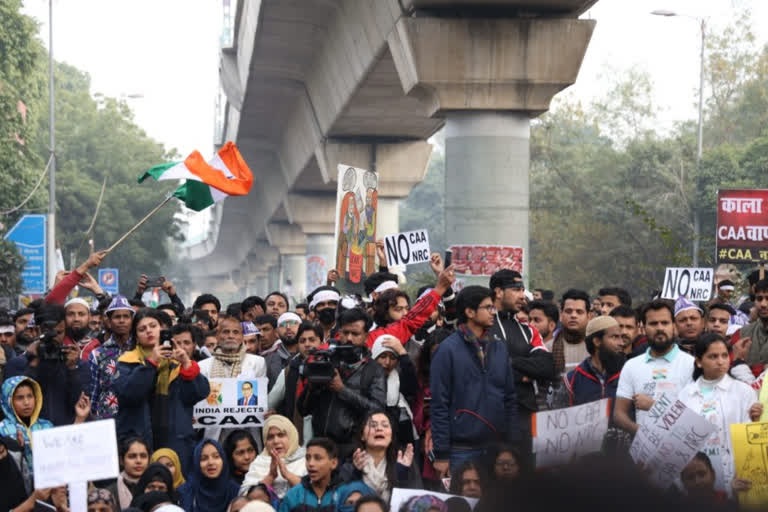Hyderabad: The Citizenship Amendment Act 2019 (CAA) has generated a wave of heated debates and violent protests in several parts of India, it has also invited criticism and adverse comments from beyond the borders, including from Islamic and non-Islamic countries.
The CAA is loud and clear in its content and intent, provisions have been made for the grant of Indian citizenship to six non-Muslim religious minorities - Hindus, Sikhs, Buddhists, Christians, Jains and Parsis - who fled any of the three neighbouring Islamic countries including Afghanistan, Bangladesh and Pakistan, on grounds of religious persecution, and took refuge in India before 31st December, 2014.
Muslims have been excluded consciously and by design from the list of eligible minorities.
The selective approach of the Government of India – both in terms of choice of countries and religious minorities - is one of the major causes for the outburst of criticism both at home and abroad. Different segments of Indian society are opposing the CAA for different reasons.
The root cause of Opposition’s criticism is that the amendment violates the Constitution of India in terms of equality ( Article 14) and is an onslaught on the concept of secularism enshrined in the Constitution of India. This view is also held by the Office of the UN High Commissioner For Human Rights whose Spokesperson is reported to have said that the CAA “appears to undermine India’s commitment to equality before law, as enshrined in its Constitution," adding that “these amendments will have a discriminatory effect on people’s access to nationality”.
The agitation in the Northeast is on account of their fear that the grant of citizenship to a large number of "illegal immigrants" (mostly from neighbouring Bangladesh), who are already residing in the region, particularly in Assam, would cause demographic and linguistic changes and thus dilute their identity and render them as a minority in their own homeland.
The Muslims are agitated over the sure-prospects of currently 'stateless' Muslims residing in India being excluded from the grant of citizenship, which is why they are accusing the Government of being anti-Muslim and discriminatory.
The CAA names and shames Pakistan, Bangladesh and Afghanistan for the persecution of non-Muslim minorities in those countries where the population of minorities has allegedly registered a sharp decline over a period of time. It is, therefore, not surprising that each one of those nations and their respective supporters have reacted to the amendment as it suits them.
Reaction to CAA: South Asia and beyond
The Pakistan National Assembly was quick in passing a resolution asking India to revoke "discriminatory" clauses in the CAA. While addressing the Global Refugees Forum in Geneva, Prime Minister Imran Khan not only made an alarmist prediction of “the biggest impending refugee crisis” but also once again threatened India with nuclear war by adding, "We in Pakistan are worried that this (refugees crisis) could lead to a conflict. A conflict between the two nuclear-armed countries.”
Bangladesh registered its protest by cancelling its Foreign and Home Ministers’ visits to India.
The Bangladesh Home minister said the policy could weaken India's character as a secular nation and rejected India’s claim of persecution of minorities in Bangladesh.
The Afghan Envoy in New Delhi said his country respected minorities, including Sikhs.
Malaysia’s leader Mahathir Mohammed, who had earlier criticised India for the abrogation of Article 370, joined the chorus and questioned the necessity of the Act. Mahathir’s anti-India utterances on issues having direct or indirect implications for Muslims must be seen in the context of his aspirations to emerge as a champion of the global Islamic community.
The self-appointed champions of human rights and advocates of religious freedoms, right to equality etc. in the Western world are also feeling obliged to offer their criticism of the Act. The US Commission on International Religious Freedom, for instance, has described the CAA as "a dangerous turn in the wrong direction".
India has promptly and appropriately snubbed and rebutted the false narrative originating from abroad while assuaging the sentiments at home through clarifications and assurances.
India need not care as to what Pakistan has to say on this issue, relations between the two countries cannot be worse than what they are at the moment. However, in order to ensure that no damage is caused to cordial relations with Bangladesh and Afghanistan, India has rightly made some conscious efforts to pacify sentiments in those countries by underlining that atrocities were committed by the military rulers in Bangladesh and Afghanistan's Taliban in the past, although the current governments were favourably disposed towards minorities.
CAA, at what cost?
The net fall out of the amendment is that it has polarised the country and damaged India’s reputation abroad as a secular country while lending further credence to ruling BJP’s perceived agenda to convert India into a Hindu majoritarian State (Hindu Rashtra).
Further, the resentment to CAA is an indicator of the magnitude of the impending opposition which the Government may have to face to implement its proposed nation-wide National Register of Citizens (NRC).
In my considered opinion, the controversy could have been avoided by not identifying the religious minorities in black and white. It should have served the purpose by simply stating that the religious minorities, who fled to India from Afghanistan, Bangladesh or Pakistan on or before 31st December, 2014 on being persecuted on religious grounds are eligible to apply for Indian Citizenship and that their application will be given due consideration after taking into account all aspects including national security while reserving the right to decline.
The Government would have thus stated the obvious without creating a situation which has led to the loss of life and damage to property and more significantly to social divide in the country.
At the moment all eyes are on the Supreme Court ruling on CAA, which has been challenged in the Apex Court by multiple organizations, as we await normalcy to return to the country.



